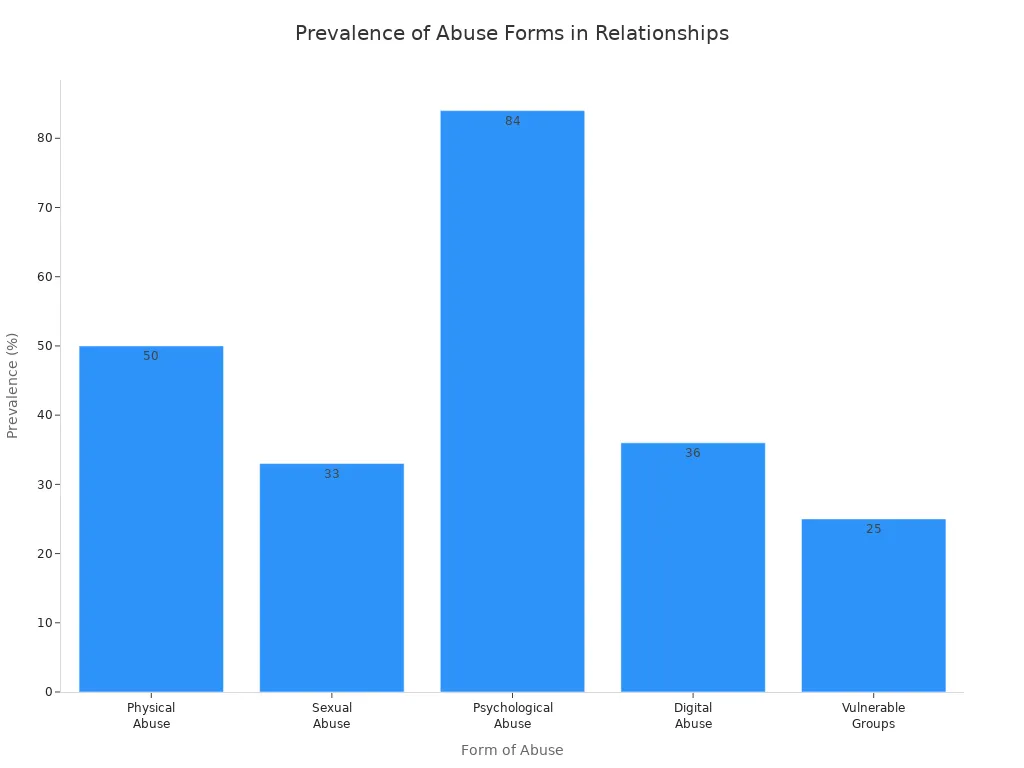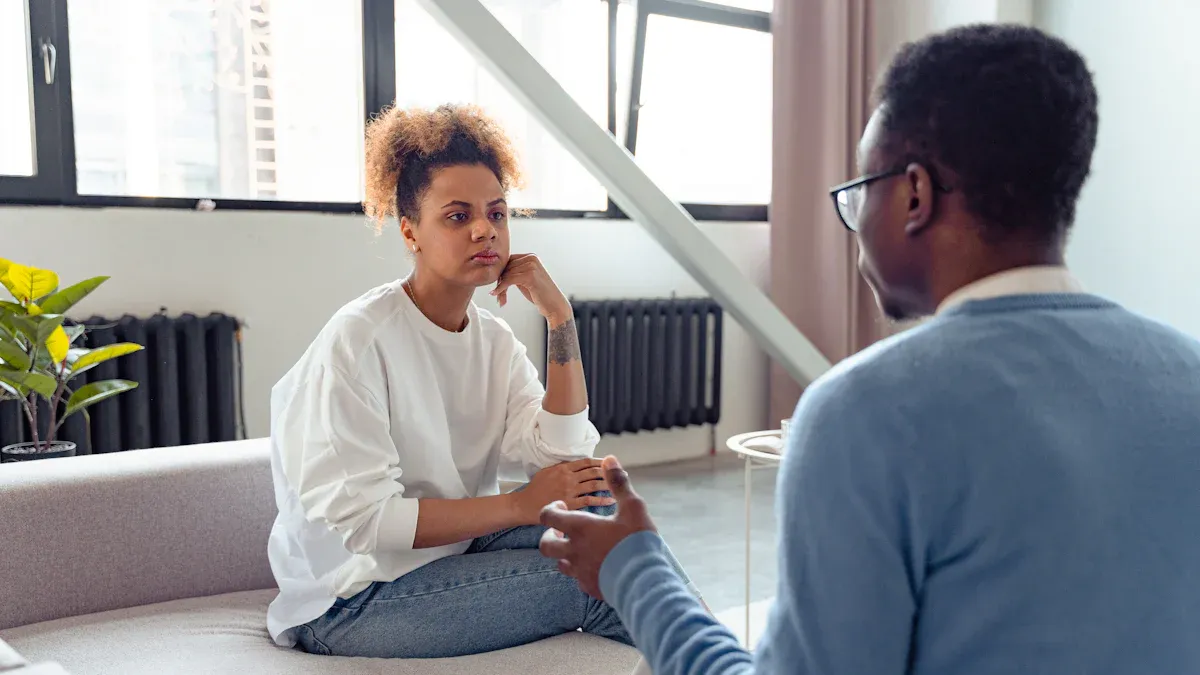Noticing relationship red flags early keeps you safe. These red flags indicate there might be problems like lying, controlling behavior, or emotional abuse. Many people learn to recognize these relationship red flags because of past bad experiences. A study found that 36% of people watch for relationship red flags after a bad relationship. Psychologists say ignoring early relationship red flags can make you feel worried or alone. But noticing these red flags helps you make better choices. Trust your gut feelings. You should always get respect and care in every relationship.
Key Takeaways
Notice early relationship red flags like no trust, controlling actions, and lying to keep yourself safe. Trust your feelings if something feels off in your relationship; your gut can warn you before things get worse. Talk openly about your worries and set clear rules to help build respect and safety in your relationship. Ask friends, family, or experts for help if you see warning signs or feel unsafe. Know when to leave a relationship that keeps showing red flags to protect your happiness and health.
What Are Relationship Red Flags?
Definition
You might ask what relationship red flags are. In psychology, experts say red flags are warning signs. These signs tell you something in your relationship may be wrong. You may feel uneasy or have doubts. Sometimes, friends or family warn you too. Psychology Today says red flags warn you about future problems. You might see insecurity or hear bad things from people you trust. You could also notice signs of abuse. Abuse can be verbal, emotional, psychological, or physical. Abuse is the most serious red flag. You should never ignore it. If you notice these signs, you can protect yourself. You can also make better choices for your relationships.
Trusting your gut helps you see red flags before they get worse.
Why They Matter
Seeing relationship red flags early can save you pain. If you ignore these signs, you might feel let down or upset. Over time, these problems can grow and make you sad. Studies show that ignoring red flags can cause:
Feeling let down, upset, or angry
Problems that never get solved
Issues that get worse over time
Bad patterns that hurt your relationship
Heartbreak, even if you try to fix things
You deserve a relationship that makes you feel good. If you notice red flags early, you can fix problems or leave before things get bad. This keeps you safe and helps you have better relationships.
Top 20 Relationship Red Flags

Lack of Trust
You might notice lack of trust if you doubt your partner. This can make you feel distant and unsure. You may skip important talks or expect too much. Trust issues often cause jealousy and fights. These problems sometimes come from past hurt. If trust is lost, the relationship may stop growing or end. Knowing this red flag helps you stay safe.
Controlling Behavior
Controlling behavior can look like criticism or spying. Your partner may try to control what you do. They might watch you or make you depend on them. This can lower your confidence and freedom. You may feel alone and cut off from others. Studies show controlling people use gaslighting and blame. These actions can make you sad or even hopeless. Setting limits helps protect you from harm.
Constant Criticism
Constant criticism can hurt your self-esteem. Your partner may always point out your mistakes. Over time, you might believe these bad things. This can make you feel lonely and rejected. Research shows too much criticism makes people want to leave. Healthy couples mix criticism with kind words. If you feel judged all the time, your relationship could be in trouble.
Excessive Jealousy
Warning Sign | Description |
|---|---|
Erosion of Trust | Jealousy weakens trust, leading to suspicion and resentment. |
Communication Breakdown | Jealousy blocks honest conversations and creates distance. |
Emotional Stress | Constant jealousy causes anxiety and stress. |
Control and Possessiveness | Jealousy can lead to controlling behaviors and restrict your freedom. |
You may withdraw from others to avoid conflict. |
Too much jealousy makes things toxic. It can cause many fights and stress. Jealousy can break down trust and make things shaky.
Dishonesty
Dishonesty means lying, hiding things, or cheating. Even small lies can ruin trust. If your partner lies, you may feel hurt or lost. Lying stops honest talks and close bonds. More lies lead to more distance. Studies say lying and cheating break up many couples. Being honest is needed for a strong relationship.
Disrespect for Boundaries
If your partner ignores your boundaries, you may feel unsafe. This can mean they invade your privacy or shame you. These actions can make you anxious or scared. Over time, you might feel powerless or angry. Respecting boundaries keeps you safe. If your partner keeps crossing lines, it is a big red flag.
Gaslighting
Gaslighting is a type of emotional abuse. Your partner may make you doubt your own mind. You might start to think you are wrong or at fault. Gaslighting can cause anxiety and sadness. Victims often feel alone and trapped. This trick can get worse over time. Spotting gaslighting early helps you stay healthy.
Emotional Unavailability
Emotionally unavailable partners avoid deep talks. You may see mixed signals or strange actions. They may only talk about simple things and avoid fights. You might feel lonely or tired. This problem can break trust and closeness. Fixing it needs honest talks or help from others.
Avoiding Conversations
Some partners dodge important talks by shutting down. They may change the subject or deny problems. This leaves issues unsolved and creates distance. You may feel ignored or upset. Avoiding talks keeps problems going. Good relationships need open talks.
Blaming Others
Blaming others creates a bad cycle. Your partner may never admit mistakes. They might blame you or someone else. This causes anger and stops good talks. Blame keeps people from learning and growing. You may feel stuck or powerless. Good relationships need people to take responsibility.
Lack of Support
Aspect | Impact on Well-being |
|---|---|
Social Support | Improves mental health, lowers stress, and fosters positive behaviors. |
Increases risk of depression, anxiety, and poor health. | |
Relationship Strain | Acts as a stressor, causing psychological and physical harm. |
If your partner does not support you, you may feel alone. Lack of support makes stress worse and hurts your health. Support helps you handle tough times.
Mood Swings
Frequent mood swings make things unstable. You may feel nervous about their reactions. Sudden mood changes cause fights and confusion. This can make you feel distant and upset. Over time, mood swings break trust and closeness.
Isolation
Isolation is a big warning sign. Your partner may stop you from seeing friends. They might cancel plans or make you feel guilty. Over time, you depend more on them and lose your support. Isolation makes it hard to see problems or get help.
Poor Communication
Signs of Poor Communication | Consequences |
|---|---|
Interrupting | Frustration, feeling unheard |
Twisting Words | Conflict, trust issues |
Stonewalling | Prevents conflict resolution |
Defensiveness | Escalates arguments |
Poor communication causes confusion and distance. If you cannot share feelings, anger grows. This can break the relationship and make fixing problems hard.
No Accountability
If your partner avoids blame, problems stay. You may see excuses or blame-shifting. This makes people angry and distant. Without accountability, trust fades. Partners may shut down or leave. Taking blame helps people grow and heal.
Rushing Intimacy
“Rushing intimacy can cause you to sacrifice your happiness and well-being by not communicating your desires, leading to resentment. Advancing physical intimacy without mutual comfort can cause anxiety, discomfort, and regret.”
Moving too fast stops you from knowing your partner. It can lead to regret and bad choices. Good relationships build trust slowly.
Secretive Actions
Secretive actions, like hiding things, block closeness. You may feel confused or hurt. Secrets often lead to more lies and distance. Over time, trust breaks and pain grows. Honest talks are needed for strong bonds.
Selfishness
Selfishness hurts trust and happiness. Your partner may ignore your needs. This can make you tired and upset. Over time, selfishness breaks talks and creates space. Good relationships need care for each other.
Disregard for Values
If your partner ignores your values, you may feel lost. Different beliefs can cause fights and stress. This can drain your energy and make you sad. Shared values build trust. Not caring about values shows you may not match.
Any Form of Abuse
Abuse can be physical, emotional, digital, or sexual. It includes hitting, insults, or controlling your online life. Abuse can cause depression, anxiety, and injury. Anyone can be a victim or abuser. Abuse is very dangerous and should never be ignored.

If you see any abuse, get help right away. Your safety matters most.
Responding to Red Flags
Trust Your Instincts
You know yourself better than anyone else. When you see relationship red flags, listen to your gut. If something feels off, it probably is. Notice your needs and do not ignore feeling uncomfortable. Being honest with yourself helps you stay happy.
Tip: Try writing your feelings in a journal. This helps you spot patterns and understand your emotions more.
Set Boundaries
Setting boundaries keeps you safe and healthy. Boundaries tell others how you want to be treated. They help you say yes when you mean it and no when you need to. Good boundaries stop anger and confusion. They also help your mind by giving you space to rest and care for yourself. In relationships, clear boundaries build respect and make you feel safe.
Communicate Concerns
Talking openly is very important. When you notice relationship red flags, talk to your partner about what worries you. Use calm words and talk about your feelings. For example, say, “I feel hurt when…” instead of blaming. Pick a quiet time to talk and listen to your partner too. If you need help, think about seeing a counselor or therapist.
Steps for expressing concerns:
Choose a calm, private time.
Explain what is worrying you.
Share your feelings, not blame.
Listen to your partner’s answer.
Be patient and keep an open mind.
Seek Support
You do not have to deal with problems alone. Ask friends, family, or support groups for help. Many groups have hotlines, counseling, and safety plans. These services give you support, advice, and teach you about healthy relationships. Getting help from others gives you new ideas and makes you stronger.
Know When to Leave
Sometimes, leaving is the best thing you can do. If relationship red flags keep happening, your health comes first. Leaving can give you freedom, self-love, and a chance to grow. You deserve to be happy and safe. Ending a bad relationship helps you set better boundaries and focus on your future.
You deserve a relationship that supports your happiness and growth. When you notice relationship red flags, trust your instincts and act quickly. Your well-being comes first. Never ignore warning signs or let fear hold you back.
Remember, you have the power to make healthy choices and build a safe future for yourself.
FAQ
What should you do if you notice a red flag early in a relationship?
You should trust your instincts. Talk to your partner about your concerns. If you still feel uneasy, consider seeking advice from a trusted friend or counselor.
Can a relationship survive if there are red flags?
Some relationships can improve if both people work together. You need open communication and a willingness to change. If the red flags continue, you may need to leave for your well-being.
How can you tell the difference between a red flag and a simple mistake?
A red flag is a repeated pattern that makes you feel unsafe or unhappy. A simple mistake happens once and gets fixed. Watch for patterns, not just single events.
Who can you talk to if you feel unsafe in your relationship?
Trusted friends
Family members
School counselors
Professional therapists
National helplines
You should reach out for help right away if you feel in danger.



Pingback: What to do during the talking stage in a relationship